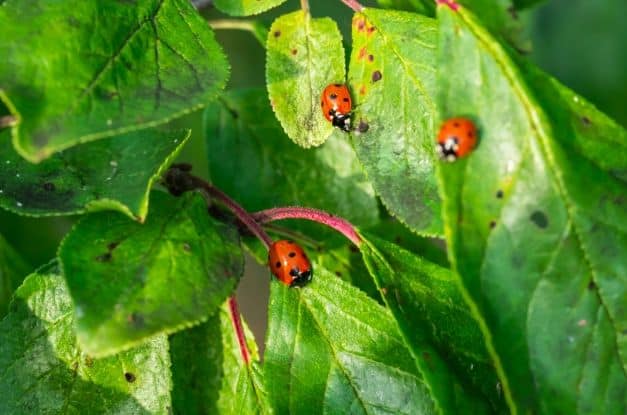Gardening is a very popular hobby among many retirees and can be a great way to unwind while spending time outdoors. However, not every aspect of gardening is always so calming. Mother Nature can be quite fickle, and sometimes even the best gardens can catch her wrath. Aside from sudden storms, an insect attack is one of the most common causes of garden damage. While there are several types of insects whose main goal is to wreak havoc on your garden, there are others still who can help your garden flourish. Distinguishing between the two types of insects is often easier said than done, unfortunately. This guide explores several different insects that can help or harm your garden and how to tend to each one.
Friends
Ladybugs
Your greatest adversary against common garden pests will be ladybugs. These brightly colored beetles may be small, but they can certainly hold their own against a variety of garden pests. Adult ladybugs regularly snack on aphids, mealybugs, mites, and many other minuscule pests. Ladybug larvae pack just as strong a punch and can do just as much damage on garden pests as their fully grown brethren. To attract ladybugs to your garden, try planting herbs that have a very strong scent, such as cilantro, dill, caraway, and fennel. Fragrant flowers, such as cosmos and geraniums, will also attract ladybugs.
Bees and wasps
Bees and wasps often get a bad reputation among gardeners because they can become quite a nuisance with all their buzzing. However, when it comes to insects that can help or harm your garden, no one is more helpful than a bee. Different bee species bring different things to the table, each of which can help your garden flourish. Honeybees and bumblebees, for example, serve as pollinators that will help fertilize your flowers with the pollen from other local flora. Wasps, on the other hand, can serve as a battalion of sorts, working to rid your garden of various pests. To attract bees and wasps to your garden, be sure to plant a variety of local plants in a variety of different colors and shapes. The more diverse your garden, the more welcoming it becomes for bees. It can also be beneficial to install a small birdbath, as bees are often attracted to small sources of stagnant water.
Foes
Aphids
Though they may be tiny, aphids can cause a significant amount of damage to even the most beautiful gardens. Aphids are attracted to a variety of plants, including fruits, flowers, vegetables, and herbs. They feed on plant sap, which causes leaves to become limp, and the excrement they leave behind supports the mold growth. Tending your garden regularly to ensure it stays healthy is a good starting place to avoid aphids. To further protect against these pests, be sure to wash your plants with a strong stream of water. Inviting helpful insects like ladybugs and lacewings into your garden is also beneficial.
Caterpillars
If you’ve ever read the story of The Very Hungry Caterpillar, you know the damage these pests can wreak on a garden. Even though they will blossom into beautiful butterflies, caterpillars do more harm than good. Caterpillars chew leaves and often tunnel into fruits and roots, causing plants to lose energy quite quickly. The best way to protect your garden against caterpillars is to hand-pick your harvest and invite natural predators into your garden. Wasps are particularly handy against caterpillars. Their grubs and larvae use the caterpillars as a host and feed off their bodies.







1 thought on “Insects That Can Help or Harm Your Garden”
Comments are closed.